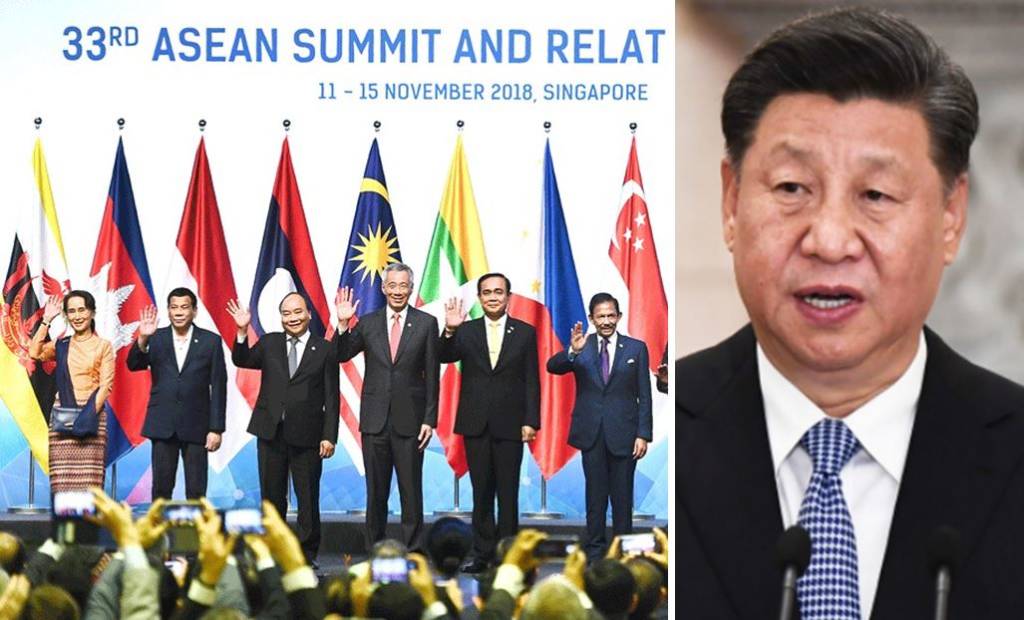The Association of Southeast Asian Nations (ASEAN) is turning the tables on China within the South China Sea. Consider this- for several years Beijing was the biggest giant in the South China Sea and despite earnest requests from the Southeast Asian nations, the Dragon was reluctant towards finalising a Code of Conduct (COC) in the disputed waterways of the South China Sea. But now that the US, Australia and India have entered the SCS, China is desperate for a COC but the ASEAN seems to be putting off a Beijing-sponsored COC for the disputed maritime region.
As per an SCMP report, China may be claiming to have made crucial headways in its talks with the ASEAN for a Code of Conduct, but regional experts feel that a COC is nowhere in sight. The Southeast Asian claimants like Vietnam and the Philippines are simply refusing to give in to China’s bait for a Code of Conduct. They know that Beijing isn’t really serious about making the South China Sea safer and therefore they are happy to delay the entire process.
Emboldened with the enhanced United States Navy support and signs of a proactive Indian Navy deployment in this part of the world, the ASEAN is now looking to dictate terms in the South China Sea. Therefore, it doesn’t come as a surprise that Beijing’s ambitious plans to finalise a COC for the South China Sea by 2021 are fast becoming a matter of derision amongst regional analysts.
Hoang Thi Ha, Lead Researcher for Political & Security Affairs at the ASEAN Studies Centre of ISEAS – Yusof Ishak Institute, Singapore said that even without the Pandemic, the Dragon’s hopes of concluding a COC by 2021 would be “an improbable target – ‘aspirational’ as ASEAN would say”.
Nevertheless, China is pushing hard for a COC in the South China Sea. Beijing even called up diplomats from the ten ASEAN members in early August and begged for renewed efforts to negotiate a Code of Conduct during the said meeting. Last week, the ASEAN held a series of meetings with both China and the US, prompting Beijing to claim that negotiations were back on track.
However, Hoang feels otherwise. The Lead Researcher said that the meeting Beijing was referring to was only about “how to resume the negotiations, not the negotiation itself”.
The South China Sea is therefore headed for a new and interesting normal in which Beijing would be the one pleading for a COC, while the ASEAN would procrastinate China’s initiatives. Tectonic changes are happening in the region and Beijing is no longer the biggest giant in the region as the QUAD- an informal strategic alliance of India, Japan, the US and Australia, is emboldening the ASEAN to beat back Chinese aggression in the disputed waterways.
With enhanced diplomatic heft and bargaining power, the ASEAN is compelling Beijing to make unprecedented concessions. Now, the ASEAN doesn’t have to accept what Beijing gives it. Ultimately, the ASEAN might itself want a COC to formally push Beijing on the backfoot, but the Southeast Asian nations want to dictate their own terms in such a COC.
A Code of Conduct for something as highly disputed as the South China Sea can hardly be egalitarian. At the end of the day, it will be about one side expressing its will over the other through a bilateral document. The ASEAN feels that it has an upper hand here and therefore wants to keep China on the edge.
The ASEAN would want to zero down on a COC but it would want any future declaration to be legally binding in accordance with the UNCLOS as against Beijing’s vision of an unenforceable COC based on its dubious nine-dash claim line that encircles almost the entire South China Sea for exercising maritime rights on “historical grounds”.
Hoang too said, “I think there will be a COC for sure, if there is enough political will from both sides. But it will be settled somewhere around a set of general principles or some mechanisms of incident management.” The battle between the two sides is therefore to secure a more favourable COC and currently the ASEAN seems to be winning the game.
The ASEAN is mounting pressure on China now. With the QUAD supporting the ASEAN, Southeast Asian nations are harassing Beijing by bringing up the 2016 South China Sea arbitral award that de-recognises China’s illegitimate claims in the South China Sea. The ASEAN members concerned with the maritime dispute are also shooting angry diplomatic notes at the United Nations in a bid to apply the UN Convention on the Law of the Sea (UNCLOS) in the South China Sea.
For China, the pressure is becoming unbearable and as the tables turn in South China Sea, Beijing suddenly finds itself on the losing side.
